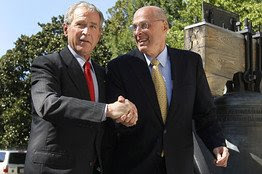
US Capitol, Washington, DC, USA. Image via Wikipedia
From: Public Agenda
As the projections for the national debt keep going worse and worse, a lot of people are probably wondering one thing: Can we really get away with this?
"This" is the federal government's strategy of spending huge amounts of money to keep the economy going, despite the fact that the federal budget was in pretty bad shape to begin with. The independent Congressional Budget Office now projects that the federal deficit will be $1.7 trillion this year, and that if President Obama's budget plans are enacted, we'll add $9.3 trillion to the national debt over the next decade. That's $4.8 trillion more than previously estimated.
Scott Bittle, in a blog posting, notes that despite fierce argument over the specifics, there's still a bipartisan consensus in Washington that the government has to borrow and spend to stimulate the economy, because nobody else will - the private sector is effectively sidelined as long as credit markets are "frozen," unwilling to lend because of all the bad debt that's already out there.
But in addition to the fight in Washington, this is also starting to make people overseas nervous. China, the largest foreign holder of U.S. debt, is starting to send none-too-subtle signals about how the U.S. manages its money, The new president of the European Union was even blunter this morning, calling American policy "the way to hell." All this will likely lead to an extremely uncomfortable session with world leaders next week on how to deal with the global financial crisis.
So can we spend like crazy now, pile up the national debt, and yet still recover later? For some possible answers to this compelling question, see our full story "The Budget: Can We Pull This Off?" and FacingUp.org, our web site dedicated to the looming problems of the budget deficit and national debt.
>All Things Reform Mobile: allthingsreform.mofuse.mobi >Capitol Switchboard: 202-224-3121 (not toll-free) >US House/Senate Mobile: bit.ly/members >Contact your reps tips: bit.ly/dear >Shortened All Things Reform URL: bit.ly/dw













 The Peterson-Pew Commission on Budget Reform will convene the nation’s preeminent fiscal and budget experts to make recommendations for how best to strengthen the
The Peterson-Pew Commission on Budget Reform will convene the nation’s preeminent fiscal and budget experts to make recommendations for how best to strengthen the 
